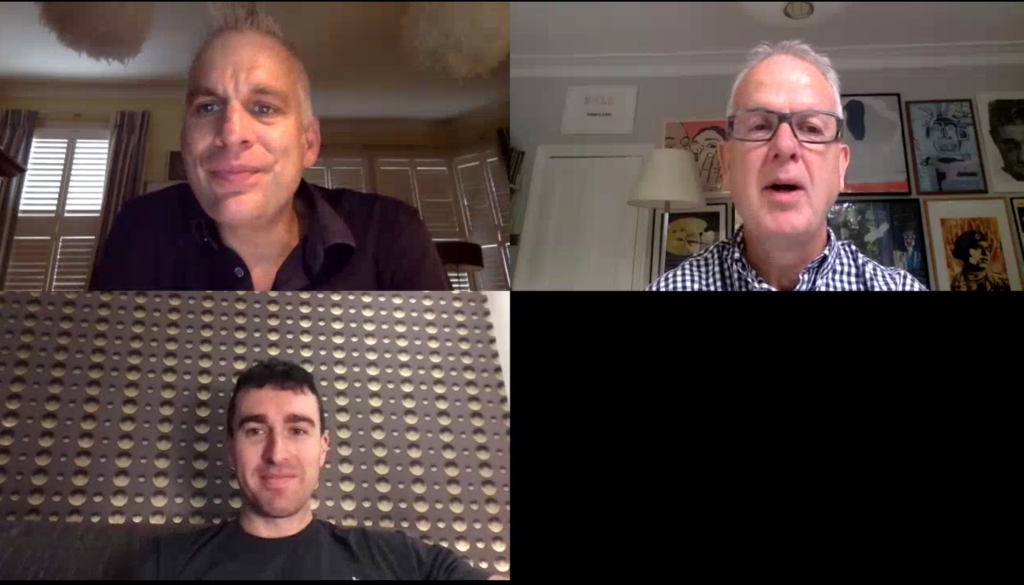Day 2 – AppCommerce Virtual Festival 2020 Round-up
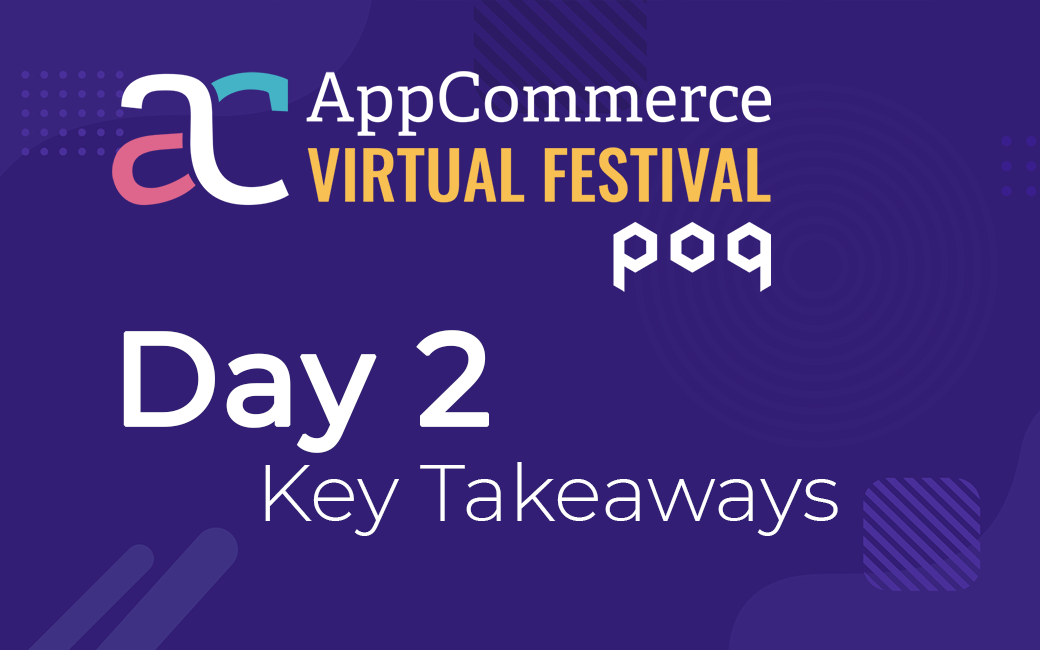
Thanks again to all of those who joined us for Day 2 of the AppCommerce Virtual Festival. We heard from a variety of talented and experienced speakers today including the likes of Studio Retail, Cotton Traders, Alceon Group and Branch. If you missed some sessions or are keen to recap what was covered, keep reading as we cover the key takeaways from the event.
We kicked off the day with a warm welcome from Helen Slaven, CRO – Poq, who shared some of the highlights from Day 1 and the first sessions held in Australia and gave a sneak peak at what to expect during the day.
AppRising: Story of Growth An Interview with Studio Retail
Chris Chalmers, Marketing and Digital Director, Studio Retail Ltd
To kick off the day Chris joined Helen Slaven, Poq CRO, on stage to discuss the business’ mvp approach to launching an app and how this quickly exceeded expectations. Chris went on to explain how the business saw extreme mobile penetration before the launch of the Studio WOW app and how most online consumers were from single-device households, this gave them the confidence to know the app would be a success.
The adoption rate of the Studio WOW app was higher than anticipated, in just 12 months, 18% of all retail sales are generated through the app with a 51% Android / 49% iOS split on devices. Chris attributes the stickiness of the app to the combination of the app being both an ecommerce store and management system for their credit offerings. Chris continued to explain that because Poq looked after the hygiene factors of the app, Studio were able to focus on content within the app and preparing for the holiday season.
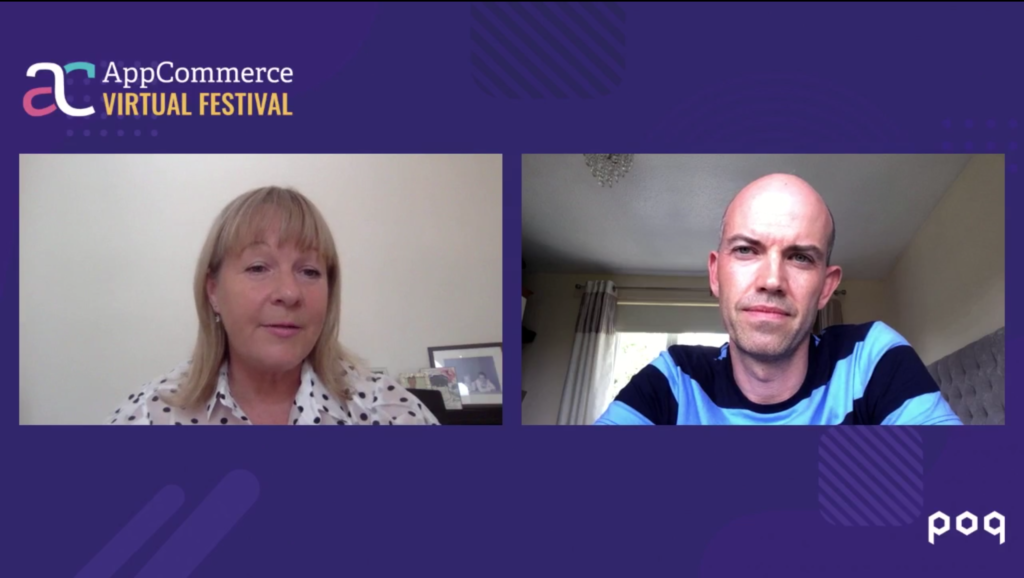
How to Stay Ahead of Your Competitors: Insights into Poq’s Platform Roadmap
Chris Long, Senior Product Manager, Poq
Staying ahead of your competitors is crucial in a noisy and densely populated market. Shoppers are quick to leave a website or app if their basic needs aren’t fulfilled. Chris went on to explain the basics of an ecommerce app; reliability, compatibility, accessibility, scalability, analytics, performance and ease of use, and how nailling these ‘Must Have’ features is essential for success.
By using a platform like Poq’s, Chris explained that retailers are empowered to work on those hook features, like swipe-to-like, AR or Buy now, Pay later that keep shoppers returning to the app, meanwhile the essentials are looked after and continually improved by the Poq team. Chris went on to explain how Poq facilitates retailers to move at speed and delight their customers as well as showing how we continually monitor app success through the App Health Index.
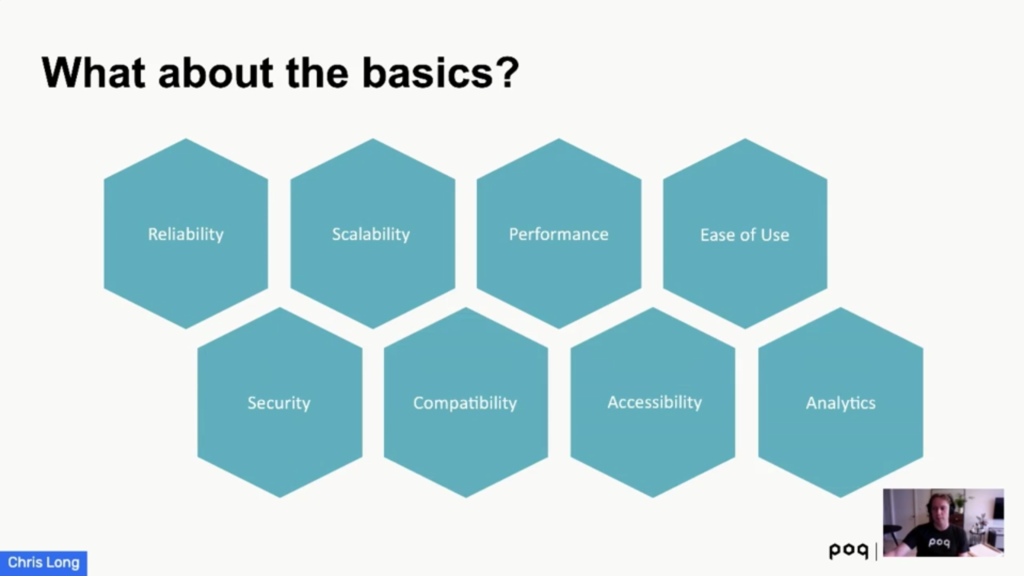
Generation Zoom: How COVID has Changed Attitudes and Relationships with Digital Technology
Lauretta Roberts, Co-Founder, CEO & Chief at TheIndustry.fashion
Shona Roberts, CMO at Cotton Traders
Rob Watson, Head of Ecommerce at Hotter Shoes
Our panel of retail experts joined forces to discuss how consumer behaviour has changed amongst shoppers aged 50+. Shona explained Cotton Traders was already on a digital growth trajectory before the global pandemic, and that since the launch of the app earlier in the year, they have seen a 59% increase in incremental revenue, a lift in AOV 13% and average units per basket lift too. With over 30,000 installs in just the first 7 weeks and averaging 14,000 app visits a week. Although some of this may have been as a result of COVID, Shona believes the acceleration in digital adoption driven by the pandemic will generate a long-lasting change as they generally see once consumers have shifted channels they are very likely to revert back to previous shopping methods.
Rob Watson from Hotter Shoes added that digital communication with their target audience, females aged 55+, been accelerated on digital channels, especially the likes of social media where consumers have adopted the channels to keep in touch with loved ones. And the app specifically has enabled them to develop a close relationship with shoppers and continue to nurture the deep relationship of the shoppers who choose to interact via the app.
Rob mentioned that as the store footprint of the business, like many others, has shrunk, precision sizing and fit – as problem the brand values itself on solving – will have to move digitally. With the success of features like AR enabling shoppers to get precision fit from the comfort of their homes and hinted that this is a feature the brand is interested in including as part of it’s continued digital efforts.

How to Maximize Your App Marketing Efficiency with ASO
Simon Thillay, Head of ASO at AppTweak
Simon covered the basics of App Store Optimization (ASO) and identified why it is so important for retailers to ensure their presence on the App Store is optimised. Simon explained that retailers can assert their brands with ASO by using keywords. In fact brand terms generate an average of 43% of total App Store traffic, despite representing only 24% of all search terms, showing the value in optimising for your own brand terminology.
Not only can ASO be used to drive new users to download your app, both organic and from ads, but ASO will help reduce costs of ad spend on other platforms by improving the conversion rate and ultimately CPA. Additionally, by optimising your App Store listing and ranking for keywords you use in your ad, the cost of Apple Search ads actually decreases. Simon finished with some tips for Black Friday and being heard above the increased noise.
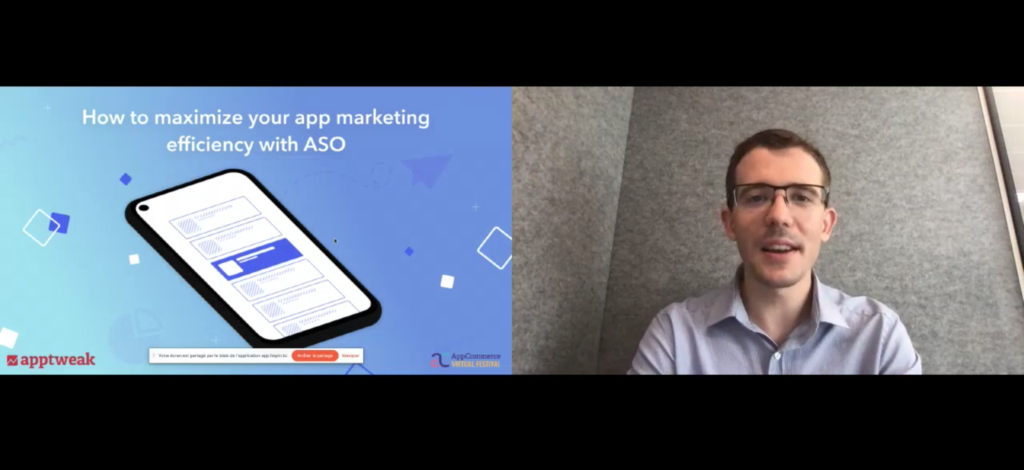
Secrets to Unlocking the App for Affiliate Marketing
Oleg Shpilev, Solutions Architect at Branch
Oleg kicked off the afternoon with his session on affiliate marketing and started by identifying tat 66% of mobile transactions occur within a mobile app, mobile apps convert better than mobile sites (3x) and apps generate 40% higher AOV vs mobile web users. However, sending a user from A to B to easier in the ‘old web’. ‘Today’s web’ and the app world, with different channels and clients, requires a more complex technical journey.
Oleg went on to explain 3 main value of apps for affiliate marketing:
- Lower user drop-off and increased conversion rate
- Seamless and unbroken deep link experience for app users
- Higher click to conversion rate
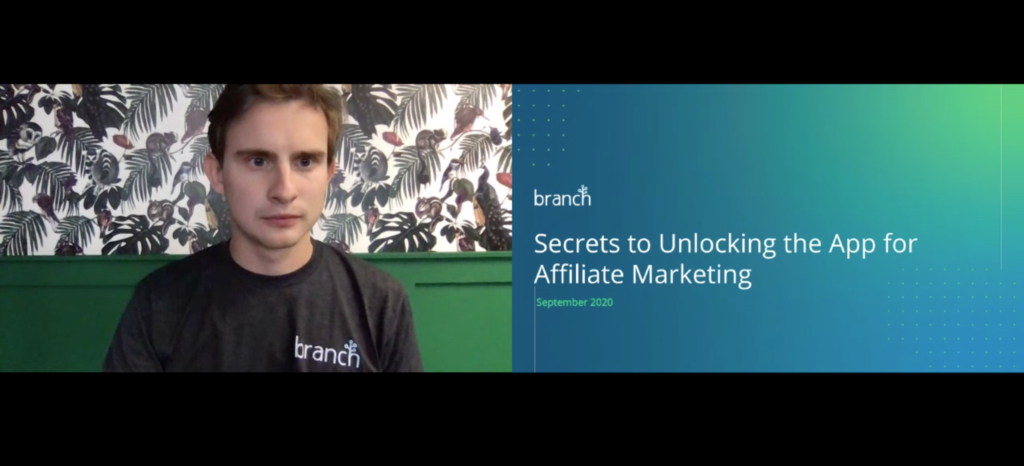
Delivering best in class App Commerce in 2020
Mike Hann, President & Co-Founder at Poq
Mike talked us through the 4 trends vital to app commerce – fundamental to a digital strategy post-covid.
- True 1:1 personalisation – building the relationship with the customer
- Store companion – build consumer confidence to re-enter stores post-covid
- Clear & intuitive navigation – closely inline with operating systems
- Hook feature – keeps users coming back, tailored to your business/brand/customer, unique to you e.g. AR.
All of this Mike shared in an app-first live presentation of 15 different apps in the market from Apple, Nike, Gucci, ASOS and more. Mike demonstrated the best aspects of these apps and how they are continuing to engage and delight customers with their unique shopping experiences. From getting the basics right with a clean and smooth shopping experience to engaging features that solve problems for both the consumer and the retailer with AR Try-on features.

Purchasing and Payments: Catering to Younger Consumers
Luke Flomo, Chief Revenue Officer at Laybuy
Andrew Busby interviewed Luke Flomo on our sessions stage to discuss how younger generations, like Gen Z, are setting the standards for purchasing and payment behaviours. Luke commented that COVID has forced many older demographics to adopt digital channels but younger generations were already on board with the concept of shopping and paying via apps. He even stated that there was a 40% y-o-y increase in app usage in Q2 2020 alone and e-wallets tend to account for a 3rd of purchases, meanwhile Buy Now, Pay Later services, like that of Laybuy are set to double over the next 2 years.
When asked what successful app commerce looks like. Luke identified that success is dependant on the audience’s needs and the problems retailers are trying to solve with an app – a recurring theme discuss across the festival so far. Engagement, AR, community etc. Bring additional value. And finally, the rollout of 5G should help prolong shopping sessions on mobile, improve conversion and make apps more accessible by facilitating people to shop anywhere with more stable network connections.

The Importance of Investing in Digital for Your Investors & Board Members
Richard Facioni, Executive Director, at Alceon
Lauretta Roberts, Co-Founder, CEO & Chief at TheIndustry.fashion
Richard Facioni joined Lauretta Roberts on the main stage to share his insights into how investors value digital transformation and the power of apps in retail. During COVID the consumer behaviour shift to online has been both a push and a pull. Apps are so important now, because there are more communications going out to consumers digitally through email and social, making it increasingly cluttered and harder to get noticed. Apps enable retailers to stand out and have direct 1:1 relationship with customers and is a channel of communication that customers have opted into.
When investing in a business, Richard advised that they look for a business to have ‘good bones’ and a defined market. At Alceon, they consider how to generate value in addition to BAU to improve the business. Especially focussing on the cost of doing business & efficiencies and gross margins through sourcing, and avoiding putting up prices, which are all things within their control.

Scan, Pay and Go: The New Frontier of In-Store Shopping
Mustafa Khanwala, Founder & CEO at MishiPay
Mustafa explained how MishiPay brings online checkout technology to the store, reducing the frustration shoppers experience. Mustafa pointed out that this is especially important because shops lose £284 billion globally because of queues in-stores. By using mobile checkout in-store retailers can gather 154 data points per user and 36% increase in basket size vs cash register.

The Future of App Commerce in Apple’s New World of Privacy
Simon Andrews, Founder at addictive!
Alex Austin, Co-Founder & CEO at Branch
Jay Johnston, CTO at Poq
This session kicked off by looking at the great new features that Apple is bringing to it’s operating system with iOS14. Jay covered how the likes of App Clips, App Library, Widgets and Apple Sign-In all could have a great impact for engagement with retail apps, and how App Clips could even be used for user acquisition.
Then onto the more controversial of Apple’s decisions, the decision to make its Identifier for Advertisers (IDFA) default to opt-in rather than an automatic opt-in as it was previously. Alex brought some great insights to the table about how this could impact publishers, advertisers and business intelligence. The lack of opt-in for the iDFA will mean that advertisers will need to look to a combination of Apple’s SKAdNetwork for aggregate data and billing and then their own link tracking for behavioural insights.
